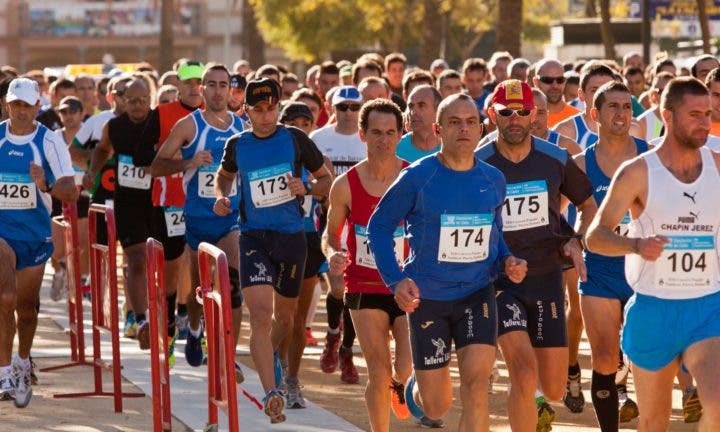When it comes to running, it is essential to maintain a training program that allows you to comply with it with discipline and thus enjoy your races to the fullest.
People who regularly compete in 5K, 10K, half marathon or full marathon races and want to improve their performance should follow a training plan where they are able to train at least 30 to 60 minutes a day, five to seven times a week and thus be prepared enough to take on a competition.
In this case, you will see how you should train to run a successful half marathon and a practical example of a training program
Actions to consider in half marathon training
1. Make comfortable runs
The races on Monday, Wednesday, and Friday are generally designed to run at a comfortable pace, so you don’t have to worry about how fast you are in these sessions. If you are training with a friend, the two of you should be able to carry on a conversation otherwise you would be running too fast. If you wear heart rate monitors, it should be between 65 and 75% of your maximum heart rate .
2. Stretch and Strength
On Mondays and Wednesdays it is recommended to spend more time stretching and doing some strength training. It’s wise to stretch every day, especially after you’ve finished the race, but focus on stretching more on Mondays and Wednesdays, not forgetting to stretch enough for your strong runs.
Remember that advanced runners have to spend more time stretching than beginners, and that it is important to do some strength exercises, such as push-ups, chin-ups, and weight work. In general, you will benefit more if you combine light weights with a high number of repetitions.

3. Variety of distances
Training for a half marathon involves everything from short and intense training sessions of 5 km to long runs of 2 hours. Don’t worry too much about running precise distances, but try to at least get closer to your set goal each day of the program.
4. Rest
Rest is as important a part as workouts. This is why it’s important to be realistic about your particular fatigue level in the final weeks of the program and not be afraid to take a day off.
5. Train on hills
A little bit of hill or mountain training will help strengthen your quads and increase speed. Find a hill between 200 and 400 meters long and run or walk the same distance between each repetition.

6. Speed exercises
If you want to run at a fast pace, you need to train your acceleration several days a week. It is recommended that these workouts include sets of 400 meters , but you can also include 800 and 1600 meters in later weeks.
7. Rhythm
A lot of runners ask, what does pace mean? , means race pace, and it is the pace you expect to run the half marathon . Some exercises in the program are designed as pace runs so that you get used to running at the pace you will need to run in the race.
8. Cross training
Cross training is not normally recommended for advanced runners, as they are more focused on the actual performance of your training and you don’t get a lot of rest compared to beginning runners. But if you consider that cross training helps prevent injuries, or if you like it, do not hesitate to practice some other activity on one or more of the scheduled days.
9. Heating
It is important not only before the race itself, but before speed training. Most beginning runners don’t warm up, except in the competitive race. You must perform adequate warm-ups in any of the circumstances in which you find yourself. For example, you can run 2 to 3 km, sit and stretch for 5-10 minutes, then run 100 meters at a sprint pace.

10. Race tests
The running tests consist of participating in popular races that are composed of distances less than the half marathon, that is, 5k, 10k and 15k . In this way, you will be able to see how your times are evolving throughout the training sessions. Throughout the training program you are recommended to participate in 3 of them whenever you have time for it.
11. Long runs
Like any seasoned runner, you probably already do long 60-90 minute rides. The training program we offer you indicates a slight increase in time as the competition date approaches.
Do not get obsessed with running these races too fast, forget about the number of kilometers to cover. Consider running a comfortable, conversational pace, except on those days when a run is prescribed.
Half marathon training program
Here you have your half marathon training program, this is only a guide and corresponds to 12 continuous weeks. You can feel free to make small modifications to suit your schedule.
Week 1
- Monday: 5 km of running + strength.
- Tuesday: 6 x mountain.
- Wednesday: 5 km race + strength.
- Thursday: 40 min of continuous running.
- Friday : Rest.
- Saturday: 5 km of race.
- Sunday: 90 min run.
Week 2
- Monday: 5 km of running + strength.
- Tuesday: 7 x 400 5 km pace.
- Wednesday: 5 km race + strength.
- Thursday: 45 min of continuous running.
- Friday : Rest.
- Saturday: 5 km of pace.
- Sunday: 90 min run.
Week 3
- Monday: 5 km of running + strength.
- Tuesday: 7 sets on hills.
- Wednesday: 5 km race + strength.
- Thursday: 30 min of continuous running.
- Friday : Rest or easy races.
- Saturday: Rest.
- Sunday: 5k race test.
Week 4
- Monday: 5 km of running + strength.
- Tuesday: 8 x 400 5 km pace.
- Wednesday: 5 km race + strength.
- Thursday: 40 min of continuous running.
- Friday : Rest.
- Saturday: 5 km of race.
- Sunday: 90 min run.
Week 5
- Monday: 5 km of running + strength.
- Tuesday: 8 sets on hills.
- Wednesday: 5 km race + strength.
- Thursday: 45 min of continuous running.
- Friday : Rest.
- Saturday: 5 km of pace.
- Sunday: 90 min run.

Week 6
- Monday: 5 km of running + strength.
- Tuesday: 8 x 400 5 km pace.
- Wednesday: 5 km race + strength.
- Thursday: 30 min of continuous running.
- Friday : Rest or easy races.
- Saturday: Rest.
- Sunday: 10k race test .
Week 7
- Monday: 5 km of running + strength.
- Tuesday: 4 x 800 10 km pace.
- Wednesday: 5 km race + strength.
- Thursday: 45 min of continuous running.
- Friday : Rest.
- Saturday: 6 km of pace.
- Sunday: 1 hour 45 min of race.
Week 8
- Monday: 5 km of running + strength.
- Tuesday: 3 x 1600 race pace.
- Wednesday: 5 km race + strength.
- Thursday: 50 min of continuous running.
- Friday : Rest.
- Saturday: 8 km of pace.
- Sunday: 1 hour 45 min of race.
Week 9
- Monday: 5 km of running + strength.
- Tuesday: 5 x 800 10 km pace.
- Wednesday: 5 km race + strength.
- Thursday: 30 min of continuous running.
- Friday : Rest or easy races.
- Saturday: Rest.
- Sunday: 15k race test.
Week 10
- Monday: 5 km of running + strength.
- Tuesday: 4 x 1600 race pace.
- Wednesday: 5 km race + strength.
- Thursday: 55 min of continuous running.
- Friday : Rest.
- Saturday: 8 km of pace.
- Sunday: 2 hours of running.
Week 11
- Monday: 5 km of running + strength.
- Tuesday: 6 x 800 10K pace.
- Wednesday: 5 km race + strength.
- Thursday: 60 min of continuous running.
- Friday : Rest.
- Saturday: 5 km of pace.
- Sunday: 2 hours of running.
Week 12
- Monday: 5 km of running + strength.
- Tuesday: 6 x 400 5K pace.
- Wednesday: 3 km race + strength.
- Thursday: 30 min of continuous running.
- Friday : Rest.
- Saturday: Rest.
- Sunday: Half marathon.

References
- Half Marathon Training Guide – Advanced Program. For Halhigdon [Revised November 2015].